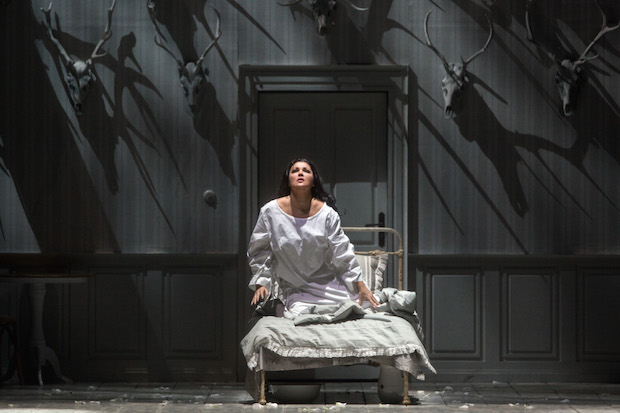Iolanta / Duke Bluebeard’s Castle
Met Opera Live
The Met’s antepenultimate relay of the season was an enterprising pairing of two operas, one of which we should see more often, and both of them done with intelligence and care. Tchaikovsky’s Iolanta, his last opera, inconveniently lasts about 100 minutes, so is especially hard to find a partner for. It is a strange, touching piece, though it has few of the characteristics we associate with him. There is hardly a memorable melody in it, and little that is overwrought, indeed the colours are pastel. Iolanta is a princess, blind from birth, but skilfully kept in ignorance of her condition, and surrounded in this production by bored maids who treat her sweetly and otherwise bitch. Suitors arrive, the more alluring of whom asks her to give him a red rose, and the bluff is called. All works out well – something else we don’t expect from this composer.
The musical performance was admirable, though Gergiev took both works too slowly. But Anna Netrebko, surely now at the height of her powers, delivered a superb account of the title role, acting it as convincingly as she sang it. To achieve that and also her terrifying Lady Macbeth earlier in the season is something I can’t imagine from any other contemporary soprano. Piotr Beczala as the victorious suitor Vaudemont was equally persuasive – difficult, considering that Tchaikovsky wrote rather feebly for the male voice on the whole. Mild enjoyment is to be had from this piece, but I can’t help wondering why Tchaikovsky didn’t make a ballet out of it, for which the material would seem more suitable.

Nadja Michael as Judith and Mikhail Petrenko as Bluebeard in Bartók’s Bluebeard’s Castle. Photo: Marty Sohl/Metropolitan Opera
After the interval, where Joyce DiDonato was the sober compere, we moved to Bartok’s great Bluebeard’s Castle. This stunning work can take one in very different ways: is it a morality for would-be partners warning them to ask no questions so they’ll be told no lies, or a parable about the necessary tragedy of being honest with one another, or one of several other possibilities? Interestingly, the glorious, glamorous music neither supplies nor suggests an answer to those questions. It is in the richest idiom, which, whatever it does, it doesn’t illuminate the state of mind of the two protagonists.
Judith, Bluebeard’s latest wife, fully aware of his reputation, nags him to reveal the truth in a kind of chant, while he stonewalls, mainly begging her not to insist on further information. Meanwhile the music moves from one sumptuous climax to the next, until the opening of the fifth door leaves you stunned for the rest of the evening. A completely different story could be inserted into this music, the richness of which casts no light on the characters’ state of mind. While Richard Strauss was trying desperately to annotate every tiny psychological twitch, Bartok sails grandly on and leaves the characters to their depressing fate. Oddly, and for me incomprehensibly, this opera still comes across as a masterpiece, a glittering objet which it would be absurd to go behind and see what there is on the other side.








Comments